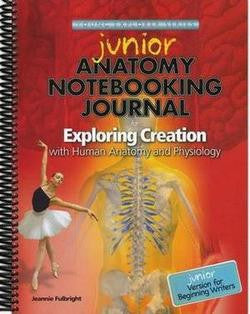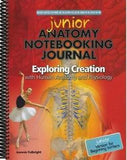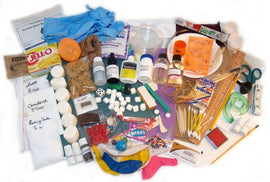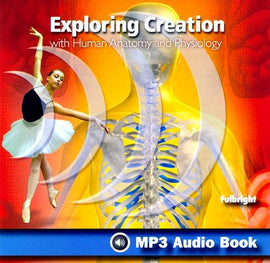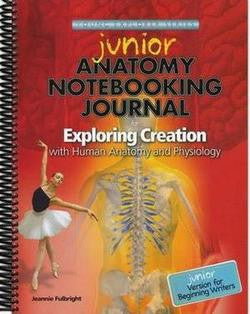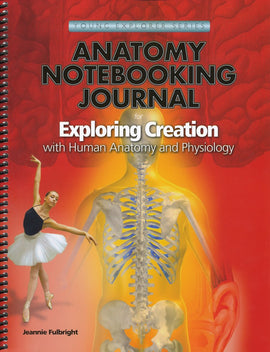Exploring Creation with Human Anatomy and Physiology Junior Notebooking Journal
The Young Explorer Series from Apologia
This notebooking journal is much like the original Anatomy Notebooking Journal but is designed for younger students or those with limited writing skills. All the lines are primary writing lines (a dashed line between two solid lines), and there are far fewer than in the original journal.
This junior journal is perfect for:
- Younger students that have not yet mastered handwriting
- Older students that are delayed in handwriting mastery
- Older students with learning disabilities
- Students that are new to written narration
Next, the student is given the opportunity to work with and learn the key vocabulary words presented in the text. Included are puzzle piece cut-out and match vocabulary activities, lift the flap vocabulary activities, partially filled-in crosswords (only two crosswords in the junior journal compared with one for each lesson in the other notebooking journals), and many more. These learning activities give the student another opportunity to see and think about the most important vocabulary words found in the lesson, increasing his retention of both the important terms and the subject matter of the text.
As well as vocabulary work, the student has a choice between print copywork, cursive, or both. The Scriptures used for copywork are shorter than in the original notebooking journal, and the font is larger.
Further, when a notebooking activity requires the student to label a diagram, a template is provided. Pointers to each part of the organ that needs to be labeled are included as well as the correct number of spaces the student needs to write the word correctly. The first letter of each word has been filled in for extra help.
Templates to complete all the notebooking assignments, the Personal Person Project with transparencies for the organs, project record keeping, Scientific Speculation Sheets and, of course, the same beautiful, full-colored miniature books found in the original notebooking journals are included in the junior journal.
There are some higher level activities missing from the junior journal, but they are replaced with cut and paste activities that bring the subject to life. What's missing?
- The lengthy and technical Vocabulary Crosswords
- The What Do You Remember? written review questions
- The Final Review
ISBN: 9781935495475
Paperback -
| Book Title | Exploring Creation with Human Anatomy and Physiology Junior Notebooking Journal |
| Publisher: | Apologia Educ. Ministries |
| Author | Jeannie Fulbright |
The Young Explorer Series from Apologia
This notebooking journal is much like the original Anatomy Notebooking Journal but is designed for younger students or those with limited writing skills. All the lines are primary writing lines (a dashed line between two solid lines), and there are far fewer than in the original journal.
This junior journal is perfect for:
- Younger students that have not yet mastered handwriting
- Older students that are delayed in handwriting mastery
- Older students with learning disabilities
- Students that are new to written narration
Next, the student is given the opportunity to work with and learn the key vocabulary words presented in the text. Included are puzzle piece cut-out and match vocabulary activities, lift the flap vocabulary activities, partially filled-in crosswords (only two crosswords in the junior journal compared with one for each lesson in the other notebooking journals), and many more. These learning activities give the student another opportunity to see and think about the most important vocabulary words found in the lesson, increasing his retention of both the important terms and the subject matter of the text.
As well as vocabulary work, the student has a choice between print copywork, cursive, or both. The Scriptures used for copywork are shorter than in the original notebooking journal, and the font is larger.
Further, when a notebooking activity requires the student to label a diagram, a template is provided. Pointers to each part of the organ that needs to be labeled are included as well as the correct number of spaces the student needs to write the word correctly. The first letter of each word has been filled in for extra help.
Templates to complete all the notebooking assignments, the Personal Person Project with transparencies for the organs, project record keeping, Scientific Speculation Sheets and, of course, the same beautiful, full-colored miniature books found in the original notebooking journals are included in the junior journal.
There are some higher level activities missing from the junior journal, but they are replaced with cut and paste activities that bring the subject to life. What's missing?
- The lengthy and technical Vocabulary Crosswords
- The What Do You Remember? written review questions
- The Final Review
ISBN: 9781935495475
Paperback -

